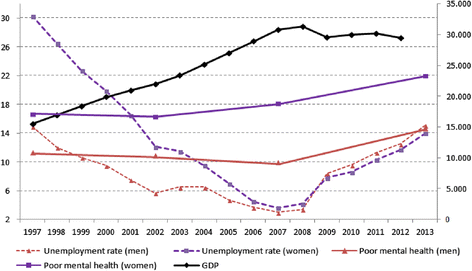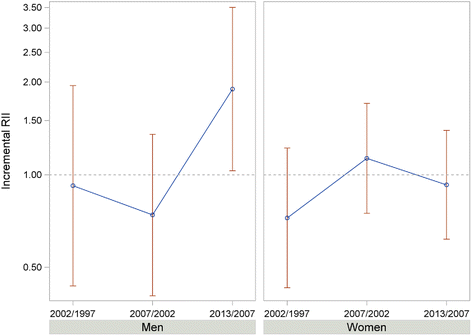The impact of the Great Recession on mental health and its inequalities: the case of a Southern European region, 1997-2013
- PMID: 26810112
- PMCID: PMC4727262
- DOI: 10.1186/s12939-015-0283-7
The impact of the Great Recession on mental health and its inequalities: the case of a Southern European region, 1997-2013
Abstract
Background: Numerous studies have shown that macroeconomic changes have a great influence on health, prompting different concerns in recent literature about the effects of the current recession. The objective of the study was to assess the changes in the mental health of the working-age population in the Basque Country (Spain) and its social inequalities following the onset of the 2008 recession, with special focus on the role of unemployment.
Methods: Repeated cross-sectional study on the population aged 16-64, using four Basque Health Surveys (1997-2013). Age-adjusted prevalences of poor mental health and incremental prevalence ratios (working status and social class adjusted) between years were calculated. Absolute/relative measures of social inequalities were also calculated.
Results: From 2008, there was a clear deterioration in the mental health, especially among men. Neither changes in employment status nor social class accounted for these changes. In men, the deterioration affected all working status categories, except the retired but significant changes occurred only among the employed. In women, poor mental health significantly increased among the unemployed. Students were also especially affected. Relative inequalities increased only in men.
Conclusions: The Great Recession is being accompanied by adverse effects on mental health, which cannot be fully explained by the increase of unemployment. Public health professionals should closely monitor the medium and long-term effects of the crisis as these may emerge only many years after the onset of recessions.
Figures
References
-
- Welz C, Vargas O, Broughton A, Van Gyes G, Szekér L, Curtarelli M, et al. Impact of the Crisis on Working Conditions in Europe. Dublin: European Foundation for the Improvement of Living and Working Conditions (Eurofound); 2013. pp. 1–70.
-
- Leahy A, Healy S, Murphy M. The European crisis and its human cost. A call for fair alternatives and solutions. Crisis monitoring Report 2014. 2014. http://www.caritas.eu/sites/default/files/caritascrisisreport_2014_en.pdf. Accessed 25 March 2015.
-
- Tapia Granados JA. Recessions and mortality in Spain, 1980–1997. Eur J Pop. 2005;21:393–422. doi: 10.1007/s10680-005-4767-9. - DOI
Publication types
MeSH terms
LinkOut - more resources
Full Text Sources
Other Literature Sources
Medical



